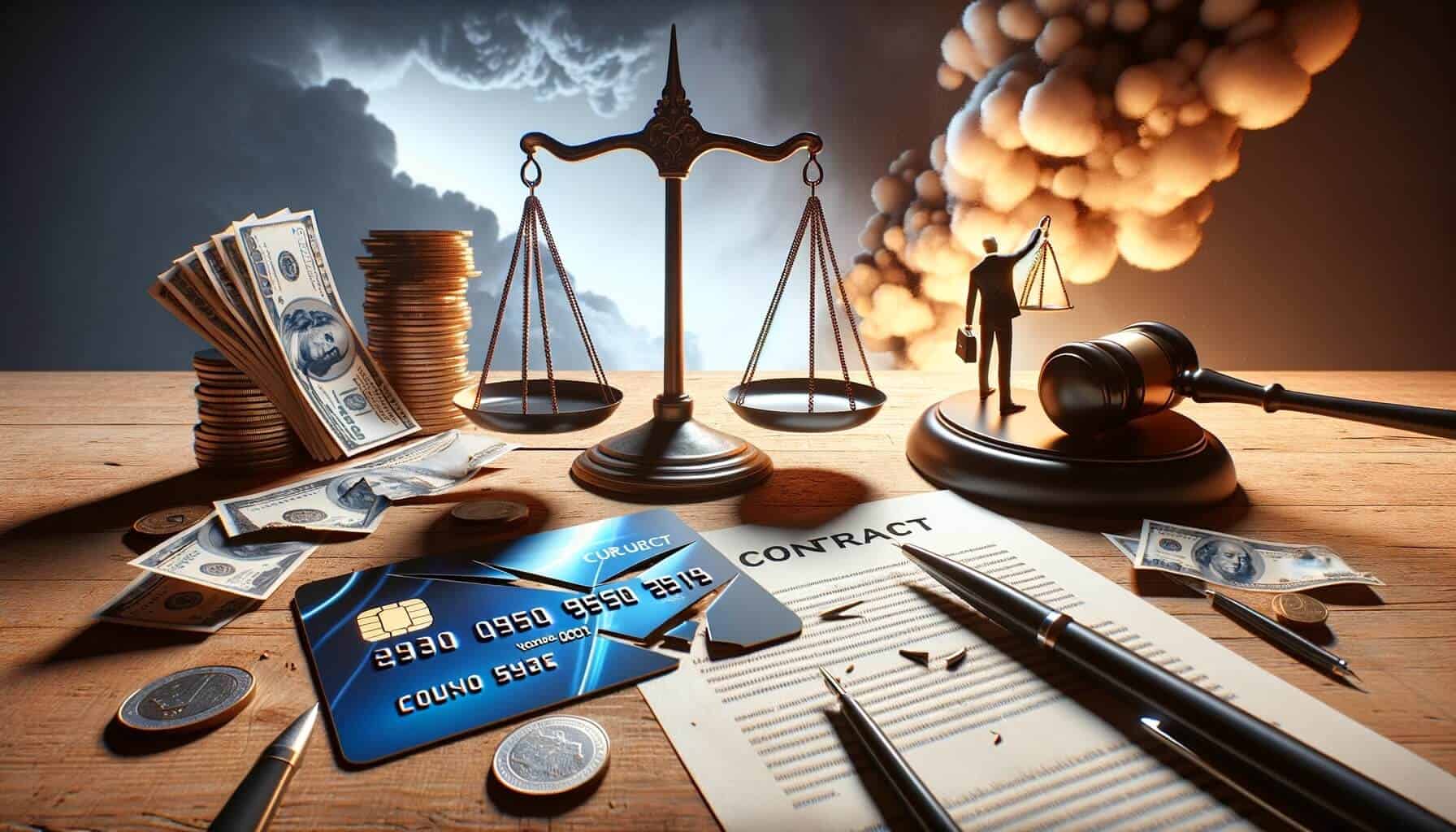
By Barbara Thomas April 23, 2025
In today’s digital age, online shopping has become increasingly popular, allowing consumers to conveniently purchase products and services from the comfort of their own homes. However, with this convenience comes the risk of fraudulent activity, both from merchants and consumers. One such fraudulent activity is the filing of false chargeback claims.
In this comprehensive article, we will explore the consequences of filing a false chargeback claim, including the legal and financial ramifications, as well as the impact on merchant-consumer relationships. We will also provide a detailed guide on how to avoid accidentally filing a false chargeback claim and what steps to take if you suspect one has been filed against you.
What is a Chargeback Claim and How Does it Work?
Before delving into the consequences of filing a false chargeback claim, it is important to understand what a chargeback claim is and how it works. A chargeback is a process that allows consumers to dispute a transaction made with their credit or debit card. It is typically initiated by the cardholder through their issuing bank, and the bank then investigates the claim to determine its validity.
Chargebacks were initially designed as a consumer protection mechanism to safeguard against fraudulent transactions, unauthorized charges, or instances where the merchant fails to deliver the promised goods or services. However, this system can be abused by unscrupulous individuals who file false chargeback claims in an attempt to obtain a refund for a legitimate purchase or to defraud the merchant.
The Importance of Accurate Information in Chargeback Claims

When filing a chargeback claim, accuracy and honesty are crucial. Providing false information or misleading evidence can have serious consequences. It is essential to provide all relevant details, such as the date of the transaction, the amount charged, and a clear explanation of the reason for the dispute. Additionally, supporting documentation, such as receipts, emails, or screenshots, should be provided to strengthen the claim.
Misrepresenting the facts or intentionally providing false information not only undermines the integrity of the chargeback process but can also lead to severe penalties for the consumer. It is important to remember that chargeback claims are subject to investigation, and any inconsistencies or falsehoods can be easily identified, potentially resulting in legal and financial repercussions.
Legal Ramifications of Filing a False Chargeback Claim

Filing a false chargeback claim is not only unethical but also illegal in many jurisdictions. The act of intentionally providing false information or misleading evidence in an attempt to obtain a refund or defraud a merchant can be considered fraud or even perjury, depending on the jurisdiction.
The legal consequences of filing a false chargeback claim can vary depending on the severity of the offense and the laws of the specific jurisdiction. In some cases, individuals found guilty of filing false chargeback claims may face criminal charges, fines, or even imprisonment. Additionally, they may be required to pay restitution to the affected merchant or compensate for any damages incurred as a result of their fraudulent actions.
Financial Consequences of Filing a False Chargeback Claim

In addition to the potential legal ramifications, filing a false chargeback claim can have significant financial consequences for the consumer. If a chargeback claim is found to be false or fraudulent, the consumer may be held liable for the disputed amount, as well as any associated fees or penalties imposed by the issuing bank.
Furthermore, repeated instances of filing false chargeback claims can result in the consumer’s credit card being flagged or even canceled by the issuing bank. This can have a detrimental impact on the individual’s credit score and future ability to obtain credit or make online purchases.
Impact on Merchant-Consumer Relationships
Filing a false chargeback claim not only affects the consumer but also has a profound impact on the relationship between merchants and consumers. Merchants rely on the trust and honesty of their customers to maintain a successful business. When a false chargeback claim is filed, it not only disrupts the merchant’s cash flow but also damages their reputation and credibility.
Merchants invest significant time and resources in investigating and responding to chargeback claims. False claims not only waste these resources but also divert attention from legitimate disputes that require resolution. This can lead to increased costs for merchants, which may ultimately be passed on to consumers in the form of higher prices or reduced services.
Moreover, repeated instances of false chargeback claims can result in merchants being labeled as high-risk by payment processors or acquiring banks. This can lead to higher processing fees, stricter underwriting requirements, or even the termination of their merchant accounts. Ultimately, this can limit the merchant’s ability to conduct business and negatively impact their overall success.
How to Avoid Accidentally Filing a False Chargeback Claim
Accidentally filing a false chargeback claim can happen due to misunderstandings, confusion, or lack of awareness about the consequences. To avoid inadvertently filing a false claim, it is important to follow these guidelines:
1. Communicate with the merchant: Before initiating a chargeback claim, attempt to resolve the issue directly with the merchant. Often, misunderstandings or disputes can be resolved through open and honest communication.
2. Understand the chargeback reason codes: Familiarize yourself with the chargeback reason codes provided by your issuing bank. Each reason code corresponds to a specific type of dispute, and understanding them can help ensure that you select the appropriate reason code when filing a claim.
3. Gather evidence: Collect all relevant documentation, such as receipts, order confirmations, shipping information, and any communication with the merchant. This evidence will strengthen your claim and help the issuing bank make an informed decision.
4. Be honest and accurate: Provide truthful and accurate information when filing a chargeback claim. Misrepresenting the facts or providing false information can have serious consequences.
5. Follow the timeline: Adhere to the timeline provided by your issuing bank for filing a chargeback claim. Failing to meet the deadlines may result in the claim being rejected or considered invalid.
Steps to Take if You Suspect a False Chargeback Claim has been Filed Against You
If you suspect that a false chargeback claim has been filed against you, it is important to take immediate action to protect your rights and mitigate any potential damage. Follow these steps:
1. Review the chargeback notification: Carefully review the chargeback notification received from your payment processor or acquiring bank. Understand the reason for the chargeback and gather any evidence that supports your case.
2. Respond promptly: Respond to the chargeback notification within the specified timeframe. Failure to respond may result in the chargeback being automatically granted in favor of the consumer.
3. Gather evidence: Collect all relevant documentation, such as proof of delivery, customer communication, and transaction records. This evidence will help support your case and demonstrate that the chargeback claim is false or unjustified.
4. Prepare a compelling response: Craft a detailed and persuasive response to the chargeback claim, addressing each point raised by the consumer. Provide clear and concise evidence that refutes their claims and supports your position.
5. Seek professional assistance if necessary: If you are unsure how to respond or believe that the situation requires legal expertise, consider consulting with an attorney or a chargeback management service. They can provide guidance and support throughout the process.
Frequently Asked Questions (FAQs) about False Chargeback Claims
Q1. What is the difference between a legitimate chargeback claim and a false one?
Answer: A legitimate chargeback claim is filed when there is a genuine dispute or issue with a transaction, such as unauthorized charges or non-delivery of goods. A false chargeback claim, on the other hand, is filed with the intention to deceive or defraud the merchant.
Q2. Can a consumer be held legally responsible for filing a false chargeback claim?
Answer: Yes, in many jurisdictions, filing a false chargeback claim is considered fraud or perjury and can result in legal consequences, including criminal charges, fines, or imprisonment.
Q3. Can a merchant dispute a false chargeback claim?
Answer: Yes, merchants have the right to dispute false chargeback claims. They can provide evidence and respond to the claim through the chargeback process.
Q4. How can merchants protect themselves from false chargeback claims?
Answer: Merchants can protect themselves by maintaining accurate records of transactions, communicating clearly with customers, and promptly responding to chargeback notifications. They can also implement fraud prevention measures and work with chargeback management services to mitigate the risk of false claims.
Q5. Can a consumer’s credit card be canceled for filing a false chargeback claim?
Answer: Yes, repeated instances of filing false chargeback claims can result in a consumer’s credit card being canceled or flagged by the issuing bank. This can have a negative impact on their credit score and future ability to obtain credit.
Conclusion
Filing a false chargeback claim can have severe consequences for both consumers and merchants. From legal ramifications to financial penalties and damaged relationships, the impact of such actions can be far-reaching. It is essential for consumers to understand the importance of accurate information in chargeback claims and to avoid accidentally filing false claims.
Likewise, merchants should be proactive in protecting themselves against false claims and responding promptly and effectively when faced with one. By fostering trust, honesty, and open communication, both consumers and merchants can contribute to a fair and secure online marketplace.